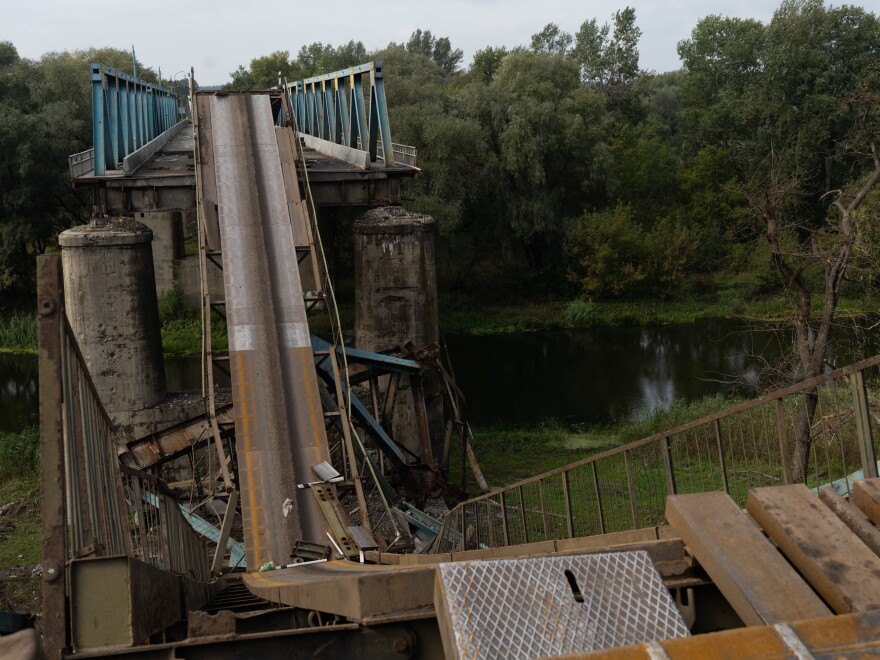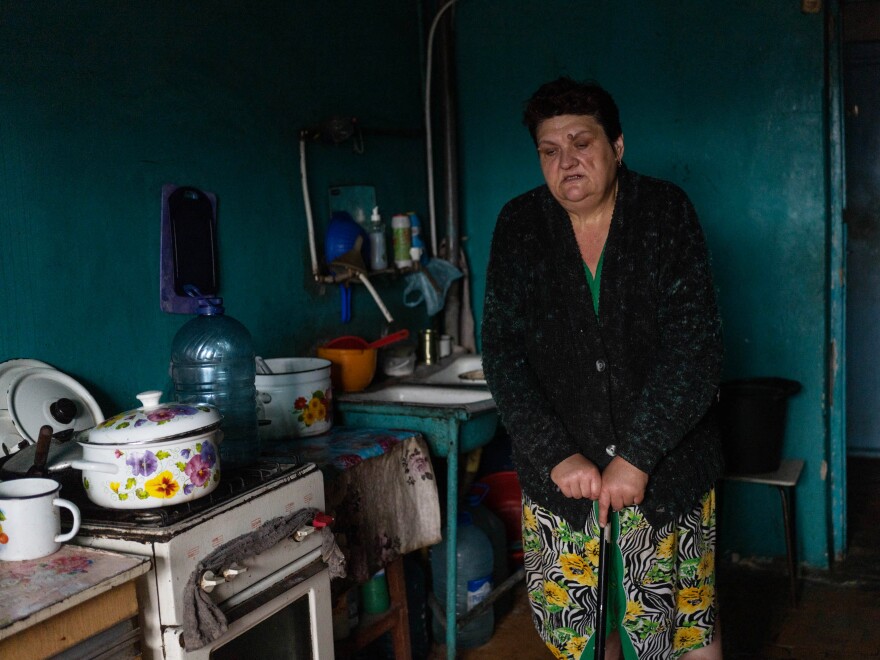IZIUM, Ukraine — Rows of handmade wooden crosses stretch into the woods outside of the newly liberated city of Izium, in northeastern Ukraine. Each marks an individual grave. Some have a name and date written in thick black marker, others have simply a number scrawled across — unidentified. Many are decorated with plastic flowers, or draped in cloth.
White barricade tape weaves between the trees, as workers dressed in blue gowns and paper face masks systematically dig up each grave, one by one, pulling out body after body, examining them and then placing them gently into white body bags lined up nearby.

They're searching for cause of death for each of the estimated 400-some bodies expected to be found at this makeshift cemetery, all thought to be civilians killed during Russia's nearly six-month occupation of the city. Investigators are hoping to find and document possible evidence of war crimes, and also to be able to identify those buried here without a name.
Izium had a population of around 46,000 before Russia's large-scale invasion was launched in late February. The city was taken on March 1, and soon became Russia's hub of operations for the area. Residents had little time to flee. Thousands ended up living under occupation — which meant constant fighting, no electricity, little access to running water or other resources and cut off communication with the outside world.
Ukrainian armed forces took back the town as part of their massive counteroffensive launched last week, which Ukrainian President Volodymyr Zelensky says has now reclaimed more than 3,100 square miles of land in the country's east. Now, Ukrainian officials are looking to see if torture was also part of the hardships residents endured under Russian control.

"There's a huge amount of work for us to do," said Oleksandr Ilyenkov, Kharkiv region's chief war crimes prosecutor, standing in front of the graves. "We have found bodies with signs of torture — hands tied behind backs, ropes around necks."
NPR witnessed at least one such body, with their hands tied behind their back, after it was pulled from a grave.

Ilyenkov pointed out that the gravesite is made up of clay soil, which has preserved many of the bodies relatively well, giving him hope that evidence would also be preserved. He said that in his 10 years as a prosecutor, he'd never seen anything like this.
Just a short drive away, the city center of Izium is almost totally destroyed. Buildings torn up by bombs, windows blown out, cars flipped and burnt. Ukrainian armed forces estimate 80% of the city is ruined from the violence.
But on a recent visit, residents were out — riding bikes, walking, feeding stray cats and dogs.

Victoria Bondarenko, 58, welcomed us into her fifth-floor apartment, which had been hit several times in the shelling. A giant hole in the roof leaked water into her building almost daily, she said, and the glass on the windows had been gone for months. A pot of potatoes boiled on a gas stove in the kitchen, but she said there hadn't been electricity since March. Like other residents, she's been visiting a nearby spring for water.
Ukrainian officials have told her that they hope to have power restored soon, but to not expect the heat to be working by winter.
"I'm at my absolute breaking point," she said, starting to cry. "I don't want to live any more."

Bondarenko described being without any credible information for nearly the entire war so far, as all communications were cut. When the town was liberated, she finally had access to the news and has been catching up nonstop on the atrocities that have unfolded in places like Bucha and Mariupol.
"I've been shocked. Absolutely shocked. I don't have any other words for it," she said.
Back at the gravesite in the woods, 72-year-old Hryhory Pryhodko, stood watching the examiners do their work. He said his wife was buried at the site, after she was killed by in an aerial assault while they were out walking together. He paid the Russians a large amount of money to allow a burial team entry into the site.

Although he didn't want his wife's body to be disturbed, he said he appreciated the work that was happening, saying the unidentified needed to be put to rest.
"When you're born, you're given a name, and these people need names when they die," he said.
He wanted to make sure the world knew his wife's name: Ludmilla. He said she was the gentlest soul he'd ever met.
"If all people were like her, there would never have been a war like this," he said, gesturing at the graves. And then he walked away.
Copyright 2024 NPR




